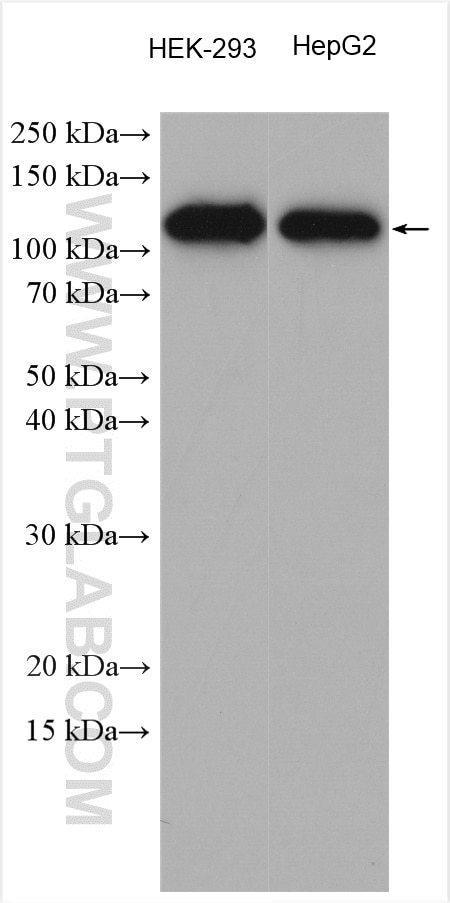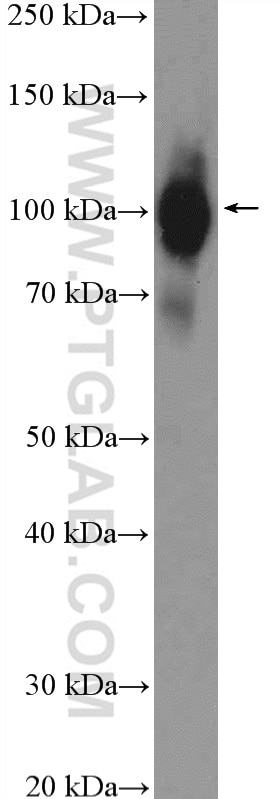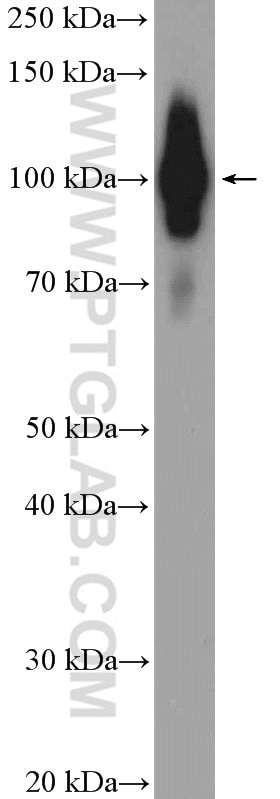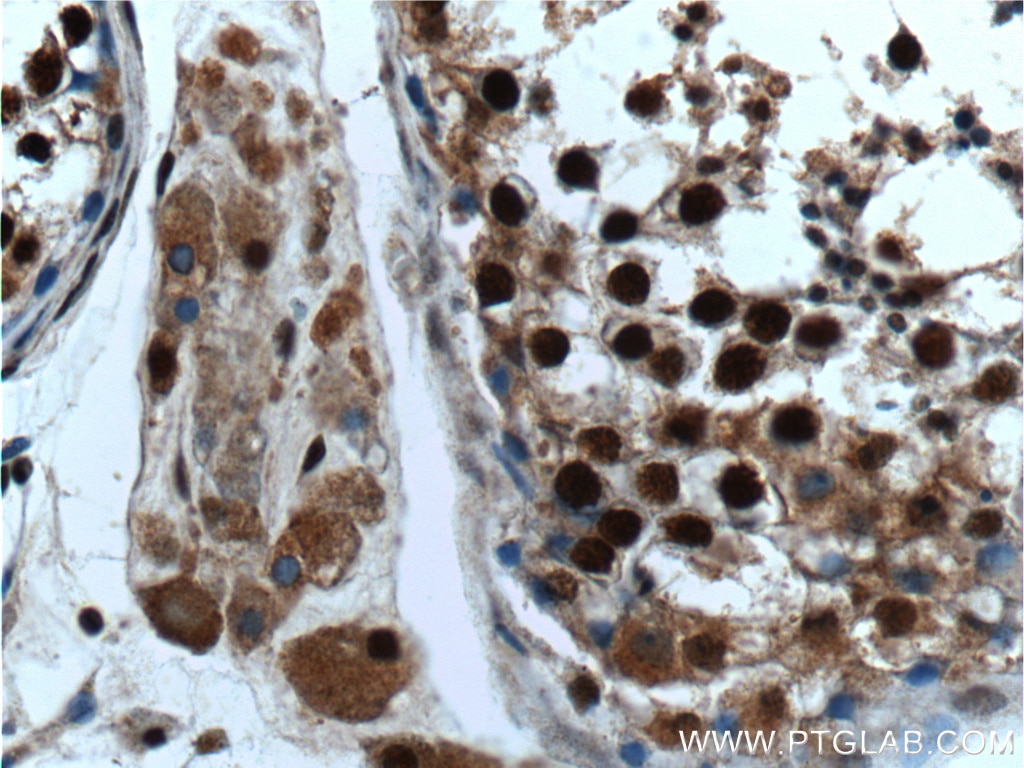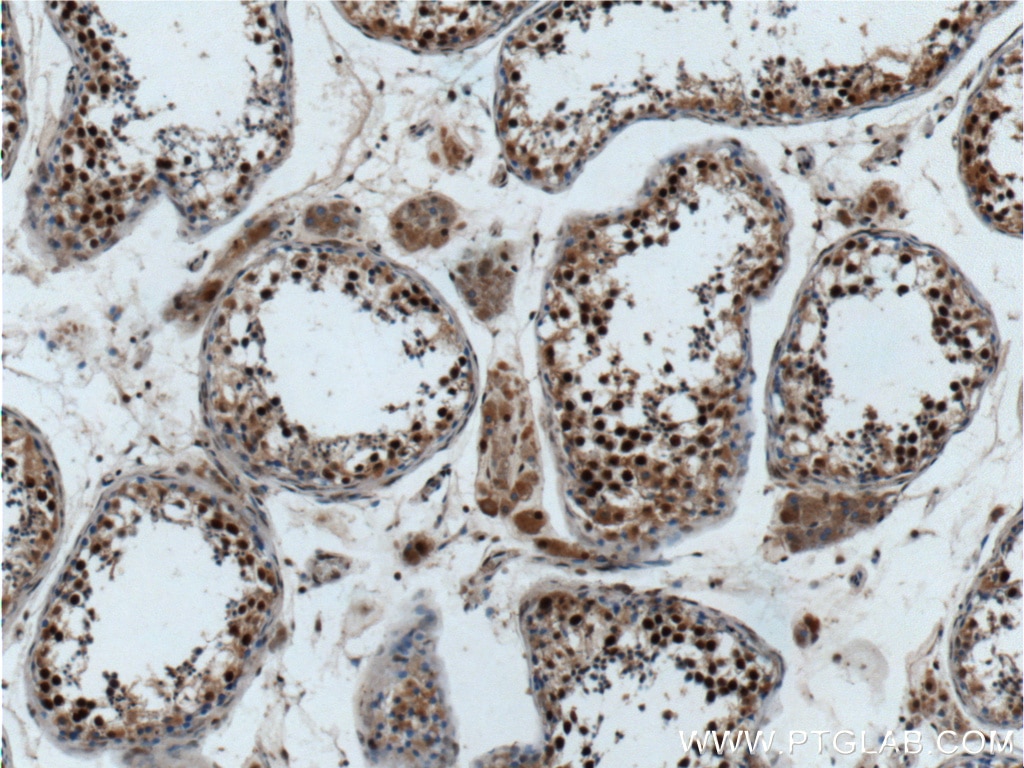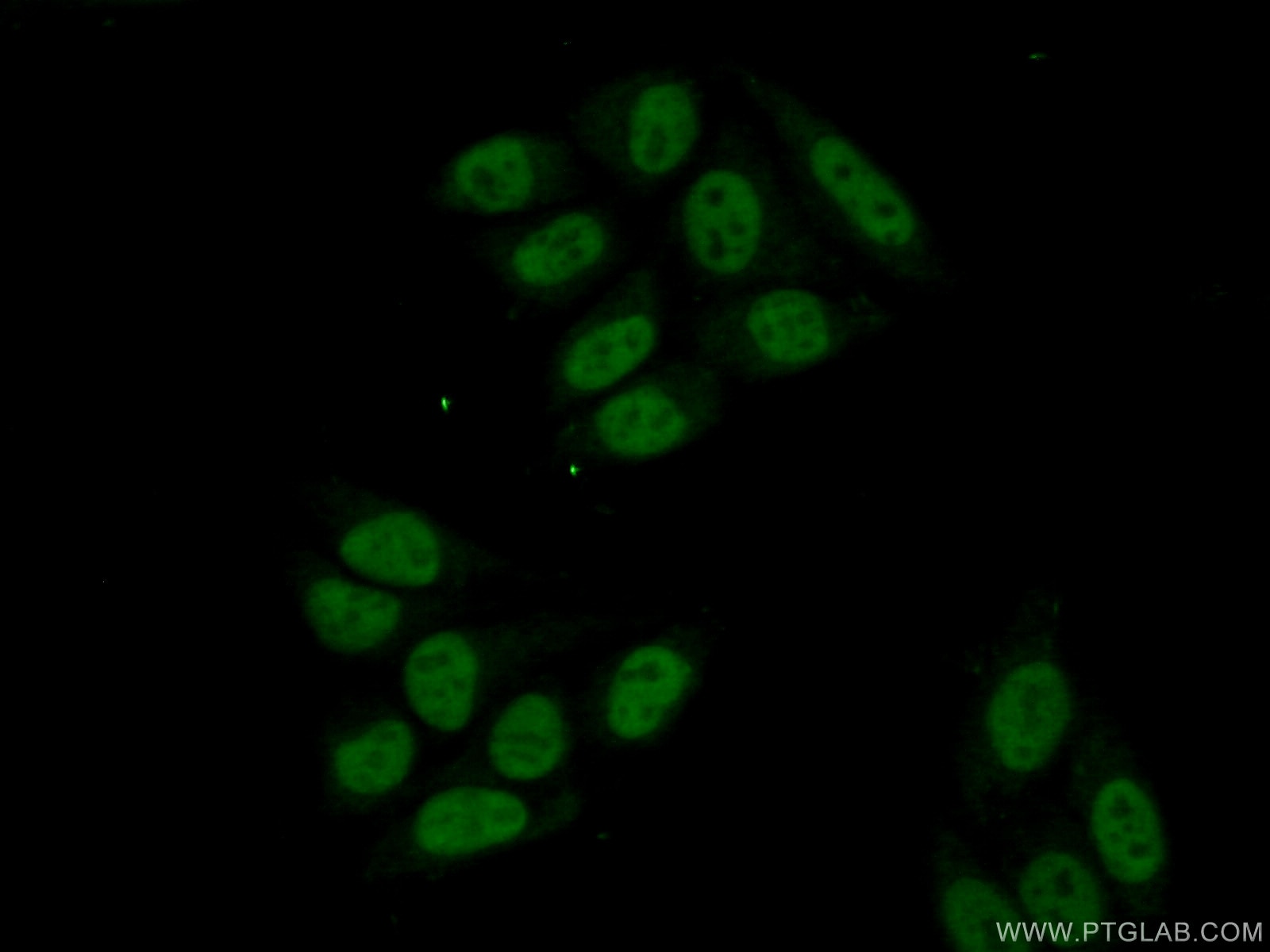- Featured Product
- KD/KO Validated
ZCCHC8 Polyklonaler Antikörper
ZCCHC8 Polyklonal Antikörper für IF, IHC, WB, ELISA
Wirt / Isotyp
Kaninchen / IgG
Getestete Reaktivität
human, Maus
Anwendung
WB, IP, IHC, IF, CoIP, ELISA
Konjugation
Unkonjugiert
Kat-Nr. : 23374-1-AP
Synonyme
Galerie der Validierungsdaten
Geprüfte Anwendungen
| Erfolgreiche Detektion in WB | HEK-293-Zellen, HepG2-Zellen, Maus-Thymusgewebe |
| Erfolgreiche Detektion in IHC | humanes Hodengewebe Hinweis: Antigendemaskierung mit TE-Puffer pH 9,0 empfohlen. (*) Wahlweise kann die Antigendemaskierung auch mit Citratpuffer pH 6,0 erfolgen. |
| Erfolgreiche Detektion in IF | HepG2-Zellen |
Empfohlene Verdünnung
| Anwendung | Verdünnung |
|---|---|
| Western Blot (WB) | WB : 1:2000-1:12000 |
| Immunhistochemie (IHC) | IHC : 1:50-1:500 |
| Immunfluoreszenz (IF) | IF : 1:50-1:500 |
| It is recommended that this reagent should be titrated in each testing system to obtain optimal results. | |
| Sample-dependent, check data in validation data gallery | |
Veröffentlichte Anwendungen
| KD/KO | See 3 publications below |
| WB | See 5 publications below |
| IP | See 1 publications below |
| CoIP | See 1 publications below |
Produktinformation
23374-1-AP bindet in WB, IP, IHC, IF, CoIP, ELISA ZCCHC8 und zeigt Reaktivität mit human, Maus
| Getestete Reaktivität | human, Maus |
| In Publikationen genannte Reaktivität | human, Maus |
| Wirt / Isotyp | Kaninchen / IgG |
| Klonalität | Polyklonal |
| Typ | Antikörper |
| Immunogen | ZCCHC8 fusion protein Ag19985 |
| Vollständiger Name | zinc finger, CCHC domain containing 8 |
| Berechnetes Molekulargewicht | 707 aa, 79 kDa |
| Beobachtetes Molekulargewicht | 90-100 kDa |
| GenBank-Zugangsnummer | BC065918 |
| Gene symbol | ZCCHC8 |
| Gene ID (NCBI) | 55596 |
| Konjugation | Unkonjugiert |
| Form | Liquid |
| Reinigungsmethode | Antigen-Affinitätsreinigung |
| Lagerungspuffer | PBS mit 0.02% Natriumazid und 50% Glycerin pH 7.3. |
| Lagerungsbedingungen | Bei -20°C lagern. Nach dem Versand ein Jahr lang stabil Aliquotieren ist bei -20oC Lagerung nicht notwendig. 20ul Größen enthalten 0,1% BSA. |
Hintergrundinformationen
The eukaryotic RNA exosome participates extensively in RNA processing and degradation. In human cells, three accessory factors (RBM7, ZCCHC8 and hMTR4) interact to form the nuclear exosome targeting (NEXT) complex, which directs a subset of non-coding RNAs for exosomal degradation. ZCCHC8 acts as a scaffold, mediating the interaction between RBM7 and MTR4. NEXT is involved in exosome-mediated surveillance and decay of noncoding RNAs, such as enhancer RNAs (eRNAs) and aberrant 3′-extended transcripts from small nuclear RNA (snRNA), telomerase RNA, and replication-dependent histone genes. NEXT is an important node in regulating nuclear exosome activities and takes part in several biological processes, including DNA damage response, stress response, and viral ribogenesis . ZCCHC8 also has a robust interaction with YTHDC1 (PMID: 28984244).
Protokolle
| Produktspezifische Protokolle | |
|---|---|
| WB protocol for ZCCHC8 antibody 23374-1-AP | Protokoll herunterladen |
| IHC protocol for ZCCHC8 antibody 23374-1-AP | Protokoll herunterladen |
| IF protocol for ZCCHC8 antibody 23374-1-AP | Protokoll herunterladen |
| Standard-Protokolle | |
|---|---|
| Klicken Sie hier, um unsere Standardprotokolle anzuzeigen |
Publikationen
| Species | Application | Title |
|---|---|---|
Mol Cell Nuclear RNA catabolism controls endogenous retroviruses, gene expression asymmetry, and dedifferentiation
| ||
Nucleic Acids Res mRNAs are sorted for export or degradation before passing through nuclear speckles. | ||
Nucleic Acids Res Concurrent binding to DNA and RNA facilitates the pluripotency reprogramming activity of Sox2. | ||
Cell Rep Nuclear Exosome Targeting Complex Core Factor Zcchc8 Regulates the Degradation of LINE1 RNA in Early Embryos and Embryonic Stem Cells.
| ||
Nat Neurosci Globally reduced N6-methyladenosine (m6A) in C9ORF72-ALS/FTD dysregulates RNA metabolism and contributes to neurodegeneration
| ||
PLoS Genet RBMX involves in telomere stability maintenance by regulating TERRA expression |
